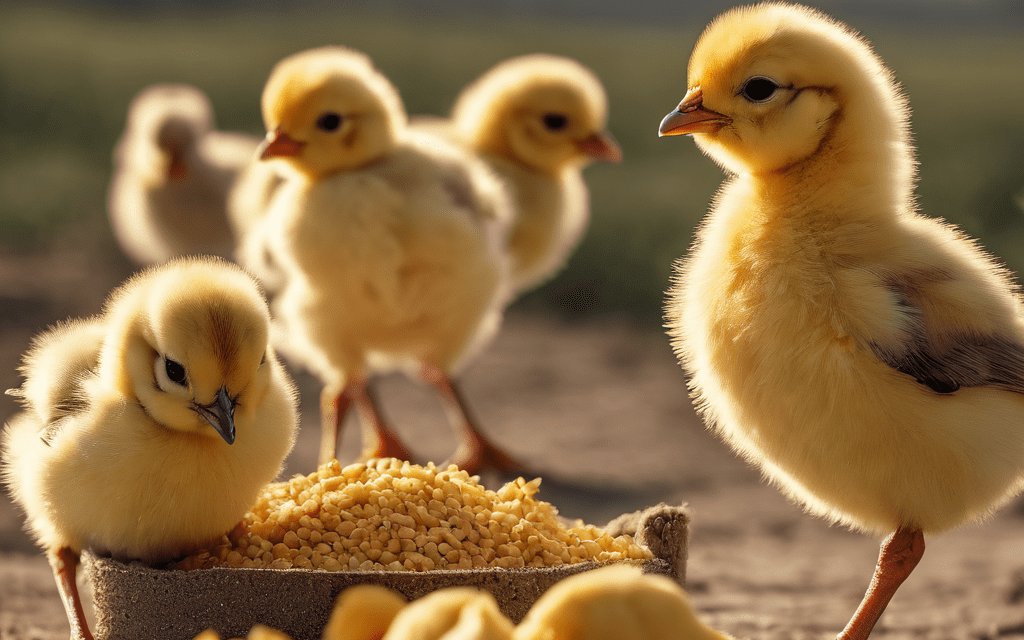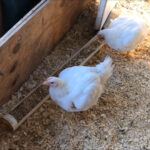As seasoned poultry enthusiasts, we embark on a journey to demystify the intricacies of feeding chickens at different stages of their development. Crafting a diet tailored to their evolving nutritional needs is not only an art but a crucial aspect of ensuring a thriving and healthy flock. Let’s delve into the nuances of poultry nutrition and unveil the secrets to fostering a robust and contented feathered family.
The First 100 Days: A Critical Feeding Phase


-
Chick Starter Feed (0-8 Weeks):
In the initial phase of their lives, chicks require a specialized diet known as starter feed. Rich in protein (18-20%), this blend supports rapid growth and feather development. Incorporating essential vitamins and minerals fosters a strong foundation for a healthy life.
-
Gradual Transition (8-12 Weeks):
As your chicks approach the adolescent stage, gradually introduce grower feed with slightly lower protein content (15-16%). This transition prepares them for the next growth spurt without overwhelming their digestive systems.
-
Pullet Developer (12-20 Weeks):
During the pullet stage, hens-in-training benefit from a diet that encourages skeletal development and prepares their bodies for egg production. Pullet developer feed with around 14-16% protein is ideal, ensuring a seamless transition to laying feed.
-
Layer Feed (20 Weeks Onward):
As your hens commence egg-laying, provide layer feed fortified with calcium (around 16-18% protein). This essential mineral fortifies eggshells, preventing issues like soft shells. Adequate calcium ensures a healthy and consistent egg-laying cycle.

In this comprehensive guide, we’ll explore the intricacies of chick feeding, from the initial days of brooding to the critical transitions in their growth. Discover the secrets to raising healthy, vibrant chicks that will thrive and contribute to the success of your poultry venture.
- Attention: Setting the Stage for Chick Success
From the moment chicks hatch, their nutritional journey begins. Proper brooding conditions, including temperature control, secure bedding, and ample space, set the stage for healthy development. - Interest: Choosing the Right Chick Starter Feed
The foundation of chick nutrition is selecting the right starter feed. Dive into the specifics of ingredients, protein content, and essential nutrients that support optimal growth and feathering in those crucial initial weeks. - Desire: Transitioning to Grower Feed for Adolescents
As chicks progress, transitioning to grower feed becomes pivotal. Uncover the nutritional requirements for adolescents, focusing on bone development, muscle growth, and overall vitality. - Action: Providing Adequate Hydration and Supplements
Hydration is a non-negotiable aspect of chick care. Learn the importance of providing clean, fresh water and explore supplemental options like vitamins and minerals to address specific needs. - Understanding Chick Feeding Behavior
Chickens exhibit unique feeding behaviors. Understand their natural instincts, from scratching and pecking to foraging, and create an environment that encourages these behaviors for both mental stimulation and physical well-being.
Top 7 Tips for Successful Chick Feeding:

- Temperature Matters: Maintain an optimal brooding temperature to ensure chicks are comfortable and stress-free.
- Quality Starter Feed: Invest in a high-quality chick starter feed that meets the specific needs of your chicks.
- Gradual Transition: When transitioning to grower feed, do so gradually to avoid digestive issues.
- Hydration is Key: Ensure chicks have constant access to clean water to prevent dehydration.
- Supplement Wisely: Use supplements judiciously and consult a poultry nutritionist for tailored advice.
- Observation and Adjustments: Regularly observe chick behavior and adjust feeding strategies based on their needs.
- Introduce Solid Foods Gradually: Introduce solid foods slowly, allowing chicks to adapt to new textures and flavors.
The journey of feeding chicks is an art that requires knowledge, observation, and a commitment to their well-being. By understanding their nutritional needs, creating suitable environments, and implementing thoughtful feeding strategies, you set the stage for a flock of healthy, vibrant chickens that will contribute to the success of your farm. Feed chicks with care, and watch them flourish into valuable members of your poultry community.
How Long Do You Feed Chicks Starter Feed?
The journey begins with the foundational question of how long to provide chicks with starter feed. Understanding the developmental stages is crucial; the initial weeks are paramount for establishing a robust foundation for future growth. Typically, chicks are fed starter feed for the first 6-8 weeks of their lives. This specially formulated feed is rich in essential nutrients, promoting healthy development.
Chicks Feeding Tray: Setting the Stage for Success
A well-designed feeding setup is pivotal in ensuring each chick receives its share of nutrition. Introducing the right feeding tray is an essential step. The tray should be spacious enough to accommodate the entire flock, minimizing competition and stress during feeding times. Keep the tray clean and easily accessible, maintaining a hygienic environment for your chicks to thrive.
How Much to Feed Chicks: Precision in Portioning
Understanding the right quantity of feed is an art that every professional poultry farmer must master. Overfeeding or underfeeding can lead to health issues. A general guideline is to provide each chick with approximately 1/4 to 1/3 pounds of starter feed per week. Adjustments can be made based on the breed, growth rate, and environmental conditions.
What to Feed Chicks by Age: Tailoring Nutrition to Developmental Stages
Chickens undergo distinct developmental phases, each requiring specific nutrients for optimal growth. In the early weeks, starter feed rich in proteins is essential. As they transition, incorporating a grower feed becomes crucial. Understanding the nutritional needs at different ages is fundamental to ensuring your chicks develop into healthy, productive layers or meat producers.
What Do You Feed Chicks: Crafting a Balanced Diet
The ingredients of your chick feed play a pivotal role in their overall health and development. A well-balanced diet should include a mix of grains, proteins, vitamins, and minerals. Consult with a poultry nutritionist to formulate a feed blend that meets the unique needs of your flock. Pay attention to the protein content, as it is vital for feather development and muscle growth.
How Long to Feed Chicks Starter: Transitioning to the Next Phase
Transitioning from starter feed to grower feed marks a crucial phase in your chicks’ development. Typically, this occurs around 6-8 weeks of age. The grower feed is formulated to support continued growth without an excess of certain nutrients present in starter feed. Monitor the transition carefully to ensure a seamless shift in their diet.
How to Feed Chicks: Best Practices for Optimal Consumption
Efficient feeding goes beyond providing the right feed—it’s about creating an environment conducive to healthy consumption. Ensure an adequate number of feeding trays to prevent overcrowding. Additionally, establish a consistent feeding schedule to promote a sense of routine among your chicks. Observing their behavior during feeding can also provide insights into their health and well-being.
What Can You Feed Chicks: Beyond Commercial Feeds
While commercial chick feeds provide essential nutrients, supplementing their diet with natural treats can enhance their overall well-being. Consider introducing small amounts of vegetables, fruits, or mealworms as treats. However, maintain a balance and avoid excessive treats, as they should complement, not replace, the primary chick feed.
Can Baby Chicks Eat Rice: Exploring Dietary Variety
Rice, when cooked and broken into small, chick-sized pieces, can be a nutritious addition to their diet. However, it should not constitute the primary feed. Use it as a supplement to their regular diet to introduce variety and additional nutrients.
Do Chicks Need to Eat All Day: Understanding Feeding Patterns
Chicks, like adult chickens, do not need to eat constantly. They will eat when hungry and stop when satisfied. Providing a consistent feeding schedule with access to fresh water is more important than allowing unlimited access to food.
How Often Do Chicks Eat a Day: Establishing a Feeding Routine
For the first few weeks, chicks typically require feeding 5-6 times a day. As they grow, the frequency can be reduced to 3-4 times a day. Monitor their behavior and adjust the feeding schedule accordingly.
What Food Can Chicks Not Eat: Safety Precautions
Certain foods are harmful to chicks and should be avoided. These include anything high in salt, sugar, or caffeine. Additionally, avoid feeding them spoiled or moldy food, as it can lead to health issues.
What Food Is Safe for Chicks: Ensuring Nutritional Safety
Stick to a well-formulated commercial chick feed to ensure they receive the necessary nutrients for optimal growth. Avoid introducing unfamiliar foods without proper research, as some may be harmful to their health.
Can Baby Chicks Eat Boiled Eggs: Protein Boosting Treats
Boiled eggs, chopped into small pieces, can be a protein-rich treat for chicks. However, moderation is key. Too much protein, even from wholesome sources, can have adverse effects.
What Do Chicks Drink: Hydration Essentials
In addition to their diet, providing access to clean and fresh water is paramount. Chicks should have continuous access to water, especially during hot weather or when they are consuming dry feeds.
Can Chicks Eat Too Much: Balancing Consumption
While it’s important to ensure chicks receive adequate nutrition, overeating can lead to health issues. Monitor their behavior and adjust portion sizes accordingly. A balanced diet is more important than unlimited access to food.
How Many Times Should I Feed My Chicken Chicks: Creating a Routine
Establish a feeding routine that aligns with the needs of your chicks. For the first few weeks, multiple small meals a day are recommended. As they grow, the frequency can be gradually reduced.
Can You Feed Chicks Too Much: Moderation in Feeding
Overfeeding can lead to obesity and health problems in chicks. Monitor their growth and adjust the quantity of feed accordingly. A well-balanced diet is more important than excess food.
Should Chicks Have Unlimited Food: Striking a Balance
While it may seem beneficial to provide chicks with unlimited food, it can lead to wastage and health issues. Establish a consistent feeding schedule and monitor their consumption to ensure they receive the right amount of nutrition.
Do Chicks Stop Eating When Full: Instinctual Eating Behavior
Chicks have a natural instinct to stop eating when they are full. Observing their behavior during feeding times can provide valuable insights into their health and satisfaction.
How Soon Do Chicks Need Food: Addressing Immediate Needs
Upon hatching, chicks can survive for up to 72 hours without food as they absorb the remaining yolk sac. However, providing access to feed and water within the first day is recommended to support their early development.
What Is the Best Feed for Chicks: Choosing Quality Nutrition Selecting
the best feed for your chicks is a decision that directly impacts their growth and well-being. Consult with a poultry nutritionist to determine the ideal blend of nutrients for your specific breed and farming goals.
How Much Water Do Chicks Need a Day: Hydration Guidelines
Chicks require a significant amount of water, especially during their rapid growth phases. Provide fresh, clean water at all times, ensuring easy access for the entire flock.
In conclusion, fueling the growth of your chicks demands a strategic and informed approach to feeding. By adhering to proper guidelines and understanding the nuanced needs of your flock, you can cultivate a healthy and thriving chicken farm. Remember, the journey from fluffy chicks to robust layers or meat producers is a partnership, and every nutritional decision you make plays a role in their success.
Author Profile

- a passionate poultry enthusiast with a deep love for chickens, has cultivated his affinity for avian companions since a young age.
Latest entries
 ChickensSeptember 14, 2023The Mystique Unveiled: A Guide to Ayam Cemani Chicken Egg
ChickensSeptember 14, 2023The Mystique Unveiled: A Guide to Ayam Cemani Chicken Egg ChickensSeptember 11, 2023Understanding the Characteristics and Care of Guinea Fowl Eggs
ChickensSeptember 11, 2023Understanding the Characteristics and Care of Guinea Fowl Eggs ChickensSeptember 3, 2023Fortify and Secure: A Guide to Fence in Chickens for Safe Flocks
ChickensSeptember 3, 2023Fortify and Secure: A Guide to Fence in Chickens for Safe Flocks ChickensSeptember 1, 2023Discovering The Cornish Cross Chicken’s Secrets
ChickensSeptember 1, 2023Discovering The Cornish Cross Chicken’s Secrets